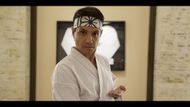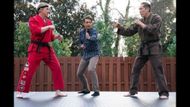Since its debut in 2018, Cobra Kai has done what few revivals manage to achieve: it brought back the energy and soul of a beloved classic while forging a fresh, emotionally rich path of its own. Now that the sixth and final season has aired, fans are still adjusting to the idea that the story might truly be over, or maybe not.
During a recent press conversation with Screen Rant, part of the promotional rollout for Karate Kid: Legends, Ralph Macchio reflected on how far the franchise has come and, more importantly, where it might go next. While staying cautious with details, he offered a small but telling assurance:
“We’re working on it.”
That brief line was enough to reignite speculation among fans, suggesting that the Cobra Kai universe may have more stories in store, possibly a prequel, a continuation, or something entirely unexpected.
Why Cobra Kai struck a chord
Set decades after The Karate Kid, Cobra Kai revisits the lives of Daniel LaRusso and Johnny Lawrence, two rivals who never quite finished their fight. But the show quickly grew into more than a nostalgia trip. It became a story about legacy, identity, and how the past shapes who we become.
Part of what made Cobra Kai work so well was its cast of younger characters. Miguel, Hawk, Sam, Tory, Demetri, and Robby weren’t just background characters, they carried the emotional weight of the story. Viewers saw themselves in these teens as they struggled with loyalty, trauma, family, and personal growth. The show honored the past, but it belonged to the present.

The journey of The Karate Kid
Everything began back in 1984, when Daniel first met Mr. Miyagi. That film wasn’t just about fighting, it was about mentorship, respect, and learning how to carry yourself with dignity. Two sequels followed, each expanding Daniel’s journey. In 1994, a new student entered the picture, Julie Pierce, played by Hilary Swank, but her story ultimately felt like a footnote.
Years later, in 2010, The Karate Kid returned with Jaden Smith and Jackie Chan. Though set in China with different characters and a new mentor named Mr. Han, the movie shared the same core values. It did well commercially and introduced the franchise to a new generation, but it stood apart from the original timeline.
Then came Karate Kid: Legends, released in 2025. This time, Ralph Macchio and Jackie Chan shared the screen, training a new student named Li Fong, played by Ben Wang. The film is set three years after the Cobra Kai finale, tying threads from both versions of the franchise into a single story. While critics had mixed feelings, fans embraced it, with many calling it the emotional payoff they didn’t know they needed.
Where does Jaden Smith’s version fit?
Jaden Smith’s Dre Parker still exists in the broader mythology, but he doesn’t appear in Legends. The filmmakers confirmed that his character is canon, but that storyline is being kept separate for now. Think of it as another branch of the same tree, connected, but growing in its own direction.

What Macchio revealed about the future
While promoting Legends, Macchio hinted that we haven’t seen the last of this world. He praised how far the franchise has come and acknowledged that fans still want more. And he’s not alone, series creators Josh Heald, Hayden Schlossberg, and Jon Hurwitz have confirmed that spin-offs are actively being discussed.
Although details are scarce, their goal is clear: expand the Miyagi-verse without repeating what’s already been done in Cobra Kai or its predecessors.
What kind of spin-offs are on the table?
Here are some ideas that have been floating around:
A series diving into Mr. Miyagi’s early life, tracing his roots in Okinawa and how he became the mentor we remember
A college-era story focused on Hawk and Demetri, whose friendship became one of the show’s most unexpected joys
Other possibilities include solo arcs for Sam, Miguel, Robby, and Tory, or even a show that steps entirely outside the current Cobra Kai timeline to explore other philosophies or fighting styles inspired by Miyagi's teachings.

The bigger picture: a universe with room to grow
From 1984 to now, The Karate Kid has evolved without losing its heart. What began as a single coming-of-age story has turned into a multi-generational saga about resilience, mentorship, and finding balance, both in combat and in life.
With Karate Kid: Legends bridging different eras and whispers of more to come, the universe feels more alive than ever. Instead of closing a door, the end of Cobra Kai may have just opened a new one.
How fans and critics are reacting
What really set Cobra Kai apart was its ability to grow up with its audience. It didn’t just bring back a beloved story, it gave it space to breathe, to change. Critics noticed how the series handled emotion with care, allowing the characters to stumble, reflect, and mature. And for those who grew up with the original films, there was something deeply satisfying about how the show paid tribute without turning into a museum piece. The references were there, sure, but they were woven in, not paraded around.
Karate Kid: Legends didn’t land quite as smoothly with reviewers. Some felt it played things a little too safe, or didn’t take enough risks. But that wasn’t the story audiences told. For many viewers, watching Macchio and Chan on screen together was a full-circle moment, years in the making. And then came Li Fong, unexpected, but magnetic. He didn’t just fill the shoes of a new lead; he brought something new to the role. Strong viewer scores speak not just to nostalgia, they point to a genuine hunger for more stories from this world and from the larger Cobra Kai legacy.
Final thoughts
Macchio’s hint wasn’t loud, but it didn’t have to be. After years of breathing life into Daniel LaRusso, he knows when to strike quietly. And for those who have followed this story since the beginning, even a quiet signal is enough.
Because if there’s one thing Cobra Kai has always shown us, it’s that you don’t need a tournament to prove your worth. Sometimes, the real battle is deciding to step back on the mat, and knowing that there’s still something left to fight for.
